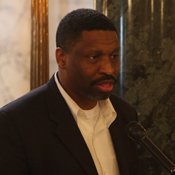Gene Marks is not a poor black kid, but he played one in Forbes magazine.
Marks, who describes himself as a middle-aged white guy from a middle-class background who's led a comparatively easy life, wrote a column in December titled "If I Was a Poor Black Kid."
In the article, Marks argues that technology is a great equalizer between middle-income white kids who have it easy and inner-city black kids who have it rough. The piece, ironically enough, went viral and sparked heated discussion on blogs and social-media sites.
"If I was a poor black kid," Marks writes, "I'd use the free technology available to help me study. I'd become expert at Google Scholar. I'd visit study sites like SparkNotes and CliffsNotes to help me understand books. I'd watch relevant teachings on Academic Earth, TED and the Khan Academy. I would also, when possible, get my books for free at Project Gutenberg and learn how to do research at the CIA World Factbook and Wikipedia to help me with my studies."
Easier said than done, especially if you're a middle-aged white man who gets to have his brain leakings published by one of the most widely circulated magazines around--and especially in light of the libraries of scholarship on the barriers to technological access facing poor black kids.
The New York City-based Center for Social Inclusion and Mississippi State Conference of the National Association for the Advancement of Colored People recently published such a study.
Published in late January, the report, "Broadband in Mississippi: Toward Policies for Access Equity," shows, overall, Mississippi ranks 41st among the states for broadband Internet availability. Furthermore, race is a primary determinant for the cost and affordability of broadband service throughout the state.
"In Mississippi, the most rural state in the nation and the state with the highest percentage of African Americans, we must implement aggressive and fair broadband infrastructure policies in order to bring Mississippi into the 21st century economy," Derrick Johnson, Mississippi NAACP president, said in a press release.
Researchers point to Mississippi State University Extension Service research that found that 46 percent of Mississippians who do not have home Internet service cite cost as the main reason.
Strikingly, the CSI/Mississippi NAACP report found: "Residential broadband costs in that state range from 1 percent to 6 percent of the median household income of African-American families, compared to 0.5 percent to 3 percent of median household income of whites in the state."
Recommendations to Mississippi policy-makers include investing in projects that make broadband more widely available in the state, holding broadband carriers accountable for beefing up their infrastructure where it's most needed, and establishing task forces in under-served areas to help shape innovation in the expansion of broadband.
Read and download the report here: http://www.centerforsocialinclusion.org/



Comments
Use the comment form below to begin a discussion about this content.